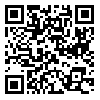BibTeX | RIS | EndNote | Medlars | ProCite | Reference Manager | RefWorks
Send citation to:
URL: http://sjsph.tums.ac.ir/article-1-5303-en.html
2- Ph.D. Assistant Professor, Department of Health Education, Faculty of Health, Arak University of Medical Sciences, Arak, Iran ,
3- Ph.D. Associate Professor, Department of Health Education, Faculty of Health, Arak University of Medical Sciences, Arak, Iran
4- Assistant Professor, Department of Health Education, Faculty of Health, Arak University of Medical Sciences, Arak, Iran
5- MSc. Instructor, Department of Epidemiology, Faculty of Health, Arak University of Medical Sciences, Arak, Iran
Background and Aim: Currently there is no standardized and validated questionnaire for assessing the care of danger signs in children less than 5 years by the mothers based on behavioral patterns. The aim of this study was to develop and evaluate psychometrically an instrument for assessment of the care of danger signs in children less than 5 years old by the mothers based on the Health Belief Model.
Materials and Methods: This cross-sectional study was carried out on 350 mothers in the City of Arak, Iran. After reviewing the related literature, an instrument was designed and its content validity ratio (CVR), content validity index (CVI) and face validity were measured. To measure the reliability of the scales, the internal consistency method was used. Data analysis was done using the SPSS software.
Results: The scores of the CVI and CVR of the 81 items were found to be 0.79 and 0.62, respectively, the items being classified into seven categories. Based on the Cronbach's alpha, the overall reliability was 0.86. The reliability of the questionnaire for checklists of performance was 0.99, followed by those of perceived benefits (0.90), severity (0.83), perceived barriers (0.68), knowledge (0.66), perceived susceptibility (0.65), self-efficacy (0.63), and cues to action (0.56). Conclusion: The output of this psychometric process study is a valid and reliable instrument for measuring symptoms of risk behaviors in the care of vulnerable children based on the health belief model constructs, which can be used in health sciences research aiming at helping to protect the health of children.
Received: 2015/12/22 | Accepted: 2015/12/22 | Published: 2015/12/22
| Rights and permissions | |
 |
This work is licensed under a Creative Commons Attribution-NonCommercial 4.0 International License. |





